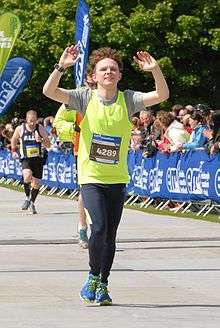Edinburgh Marathon
| Edinburgh Marathon | |
|---|---|
| Date | May |
| Location | Edinburgh and East Lothian, Scotland |
| Event type | Road |
| Distance | Marathon, Half marathon, 10K, 5K |
| Established | 2003 |
| Course records |
Men: Women: |
| Official site | Edinburgh Marathon |
The Edinburgh Marathon is an annual marathon event, run in Scotland over the traditional distance of 42.195 kilometres (26.219 mi). The first marathon event in Edinburgh was in 1982. Further marathons were held in Edinburgh in 1986 and 1999. Since 2003 the Edinburgh Marathon Festival has been held each year, usually in May. The current route begins in the city centre, moves out of Edinburgh into East Lothian, finishing at Musselburgh, East Lothian. The Edinburgh Marathon has IAAF Bronze Label status and is governed by Scottish Athletics.

History
On 5 September 1982, the Edinburgh Festival Marathon was the first mass marathon event to be held in the city.[1] Starting in Holyrood Park and running through the Grassmarket and down Lothian Road, along Princes Street and down into Leith, along to Cramond and along the coast back through Silverknowes to Leith, up Easter Road and finishing in Meadowbank Stadium. In 1986 it was called the Commonwealth Games People’s Marathon and held in June, a month ahead of the Commonwealth Games.[2] In 1999 the PUMA Edinburgh Marathon was held, leaving from Dunfermline and finishing in Meadowbank Stadium, Edinburgh.[3]
The Edinburgh Marathon Festival was founded by Geoff Sims and the first year’s event on 15 June 2003, attracted just 3,000 participants. The course started at Meadowbank Stadium, taking in Princes Street, Holyrood Palace and the Royal Yacht Britannia.[4] Frank McGowan from Glasgow won the men’s race in 2.35 with the slowest man Lloyd Stott taking more than six days to complete the race wearing a deep sea diving suit weighing more than 100 pounds.
In 2007 organisers designed a new route, that headed into East Lothian through, Musselburgh, Prestonpans, Cockenzie, Port Seton to Gosford House, then back up to the finishing line at the playing fields at Pinkie St Peter’s Primary School, Musselburgh. With an elevation drop of 40 metres, the average finish time was almost 12 minutes faster than previous year's Edinburgh earned its title of UK’s fastest marathon. It was the first year that the event made a profit.[5] Road closures for the new route affected around 130 streets.[6]
In 2010, the half marathon was introduced for the first time with entry levels jumping to more than 24,000.
2011 was the first time the Edinburgh Marathon Festival was hosted over two days. As well as the full marathon, the festival also included a 5K, 10K, two junior races and a half marathon and a team relay race, affectionately named the "Hairy Haggis."
Men's winners
| Year | Athlete | Nationality | Time (h:m:s) |
Notes |
|---|---|---|---|---|
| 1982 | Dave Ellis | 2:21:09 | [1] | |
| 1983 | Lindsay Robertson | 2:21:36 | [7] | |
| 2003 | Graham Reilly | 2:16:21 | ||
| 2004 | Zachary Kihara | 2:21:45 | ||
| 2005 | Zachary Kihara | 2:15:26 | ||
| 2006 | Joseph Mbithi | 2:15:46P | ||
| 2007 | Ian Grime | 2:31:57 | ||
| 2008 | Paul MacNamara | 2:25:05 | ||
| 2009 | Martin Williams | 2:18:24 | ||
| 2010 | Steve Littler | 2:26:31 | ||
| 2011 | Phil Nicholls | 2:19:21 | ||
| 2012 | John Mutai | 2:19:52 | ||
| 2013 | Tola Lema | 2:15:32 | [8] | |
| 2014 | David Toniok | 2:15:33 | ||
| 2015 | Peter Wanjiru | 2:19:36 | ||
| 2016 | Boaz Kiprono | 2:19:55 | [9] | |
| 2017 | Julius Korir | 2:17:13 | ||
| 2018 | Joel Kiptoo | 2:13:33 | Course record |
Half Marathon
| Year | Athlete | Nationality | Time (h:m:s) |
Notes |
|---|---|---|---|---|
| 2010 | Dave Webb | 1:04:45 | [10] | |
| 2011 | Andrew Douglas | 1:06:49 | ||
| 2012 | Michael Deason | 1:08:20 | ||
| 2013 | William Ryan Beattie | 1:09:30 | ||
| 2014 | Ross Houston | 1:07:16 | ||
| 2015 | Thomas Porter | 1:08:58 | ||
| 2016 | Darrell Hastie | 1:10:38 | ||
| 2017 | Pasquale-Roberto Rutigliano | 1:09:39 | ||
| 2018 | Severino Gómez | 1:10:37 |
Women's winners
| Year | Athlete | Nationality | Time (h:m:s) |
Notes |
|---|---|---|---|---|
| 1982 | Leslie Watson | 2:49:34 | [1] | |
| 1983 | Patricia Marshall | [7] | ||
| 2003 | Michaela McCallum | 2:48:06 | ||
| 2004 | Walentyna Poltawska | 2:47:24 | ||
| 2005 | Zinaida Semenova | 2:33:36 | Course record | |
| 2006 | Angela Howe | 2:51:41 | ||
| 2007 | Fiona Matheson | 2:54:43 | ||
| 2008 | Pauline Powell | 2:47:56 | ||
| 2009 | Holly Rush | 2:41:38 | ||
| 2010 | Sarah Gee | 2:38:16 | ||
| 2011 | Sarah Harris | 2:42:59 | ||
| 2012 | Nataliya Lehonkova | 2:39:48 | ||
| 2013 | Risper Kimaiyo | 2:35:58 | ||
| 2014 | Kateryna Stetsenko | 2:36:07 | ||
| 2015 | Joan Kigen | 2:39:42 | ||
| 2016 | Eddah Jepkosgei | 2:39:53 | [9] | |
| 2017 | Eddah Jepkosgei | 2:37:46 | ||
| 2018 | Caroline Jepchirchir | 2:47:35 |
Half Marathon
| Year | Athlete | Nationality | Time (h:m:s) |
Notes |
|---|---|---|---|---|
| 2010 | Dianne Lauder | 1:16:59 | [10] | |
| 2011 | Becky Penty | 1:15:31 | ||
| 2012 | Gabriela Traña | 1:15:01 | ||
| 2013 | Dianne Lauder | 1:24:50 | ||
| 2014 | Gladys Ganiel | 1:17:26 | ||
| 2015 | Gemma Rankin | 1:17:21 | ||
| 2016 | Tracy Millmore | 1:18:41 | ||
| 2017 | Avril Mason | 1:19:49 | ||
| 2018 | Breege Connolly | 1:16:07 |
Finisher statistics
Total of runners finishing the original marathon distance
| Year | Men | Women | Total |
|---|---|---|---|
| 2003 | 2028 | 754 | 2782 |
| 2004 | 2114 | 738 | 2853 |
| 2005 | 3227 | 1192 | 4419 |
| 2006 | 2926 | 1170 | 4096 |
| 2007 | 2538 | 1031 | 3587 |
| 2008 | 4520 | 2092 | 6612 |
| 2009 | 5570 | 2684 | 8254 |
| 2010 | 6647 | 2812 | 9459 |
| 2011 | 6797 | 2940 | 9737 |
| 2012 | 5425 | 2638 | 8063 |
| 2013 | 5414 | 2728 | 8142 |
| 2014 | 5806 | 2809 | 8615 |
| 2015 | 4796 | 2389 | 7185 |
| 2016 | 4274 | 2322 | 6596 |
Criticism
Whilst the race starts in Edinburgh, less than eight miles of the course lie within the city boundaries, with the majority being run in East Lothian (including the Finish at Musselburgh). The course encompasses less than three miles of the city centre.
For the 2014 race, the organisers sent competitors details of their individual times but initially did not publish the full results, only giving times for the top three in each category.[11] Within a few days, EMF events issued an apology via their website and published the full results.[12]
References
- 1 2 3 "Marathon protest by pro runners". The Glasgow Herald. 6 September 1982. p. 18. Retrieved 31 May 2016.
- ↑ Douglas, Derek (31 January 1986). "Marathon gets a new start". The Glasgow Herald. p. 5. Retrieved 31 May 2016.
- ↑ "Race future in balance already". The Herald. 27 September 1999. Retrieved 27 May 2018.
- ↑ "The race that just seems to run and run". The Scotsman. 13 June 2003. Retrieved 31 May 2016.
- ↑ "Edinburgh Marathon boss tells of his journey to the big day". The Scotsman. 29 May 2009. Retrieved 31 May 2016.
- ↑ "Edinburgh Marathon build-up - and road closures guide". The Scotsman. 23 May 2008. Retrieved 28 May 2017.
- 1 2 Cusick, James (5 September 1983). "Police gear up for Glasgow marathon". p. 3. Retrieved 31 May 2016.
- ↑ Minshull, Phil (2013-05-26). Lema and Kimaiyo take the honours at the Edinburgh Marathon. IAAF. Retrieved on 2013-05-31.
- 1 2 Woods, Mark (30 May 2016). "Kenyan dominance of Edinburgh marathon continues". The Herald. Glasgow. Retrieved 31 May 2016.
- 1 2 "Scottish Half Marathon, Edinburgh, 23 May 2010". RunBritain Rankings. Retrieved 13 November 2017.
- ↑ Pendreigh, Brian; Munro, Alistair (27 May 2014). "Edinburgh Marathon slammed for withholding results". The Scotsman. Retrieved 28 May 2017.
- ↑ Christie, Kevan (3 June 2014). "Edinburgh Marathon bosses run out of excuses". The Scotsman. Retrieved 6 January 2015.
